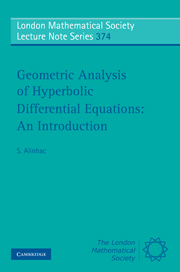Book contents
- Frontmatter
- Contents
- Preface
- 1 Introduction
- 2 Metrics and frames
- 3 Computing with frames
- 4 Energy inequalities and frames
- 5 The good components
- 6 Pointwise estimates and commutations
- 7 Frames and curvature
- 8 Nonlinear equations, a priori estimates and induction
- 9 Applications to some quasilinear hyperbolic problems
- References
- Index
8 - Nonlinear equations, a priori estimates and induction
Published online by Cambridge University Press: 05 February 2012
- Frontmatter
- Contents
- Preface
- 1 Introduction
- 2 Metrics and frames
- 3 Computing with frames
- 4 Energy inequalities and frames
- 5 The good components
- 6 Pointwise estimates and commutations
- 7 Frames and curvature
- 8 Nonlinear equations, a priori estimates and induction
- 9 Applications to some quasilinear hyperbolic problems
- References
- Index
Summary
In the preceding chapters, we considered the wave equation associated with a given Lorentzian metric g, and explained various ways of analyzing the qualitative behavior of the solutions of this equation. This linear problem is of interest in itself, and is far from being solved with some generality (see, for instance, [6] for an answer to a natural decay question). However, in the literature much emphasis has been put on nonlinear problems, that is on problems where the metric g depends on the solution itself. One of the most interesting of these problems is the Cauchy problem for the Einstein equations, where the metric g itself is the unknown. For these nonlinear problems, since the metric is not given a priori, we have to explain how the preceding techniques can be used. It turns out that the problem of the long time existence of solutions can be reduced to some a priori estimates of the solutions of a wave equation associated with a given metric. The main concept which makes this possible is that of “induction on time.” We first explain this concept with a very simple ordinary differential equation (ODE) example; after that, to illustrate how the method works for PDE, we present a classical result on the lifespan of solutions to some quasilinear wave equation with small smooth data.
- Type
- Chapter
- Information
- Publisher: Cambridge University PressPrint publication year: 2010



